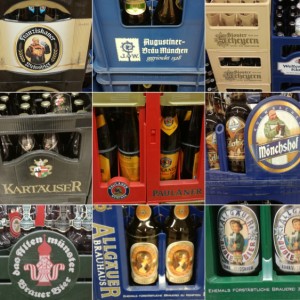Cheating
During the day I have had a few remarks about an item I posted in my senior school's old pupils, closed group, Facebook page. It is a Catholic school attached to a Benedictine Abbey and while the running of the school is nowadays largely carried out by lay staff, the influence of the Catholic church remains.
So I have decided to cheat and simply copy the item, much of which I have at one time or another Bliped. I did actually write it after midnight, i.e. today but the photo was taken on Saturday evening.
And I feel less guilty as much of the item is about the 13th Century monks - Cistercians I might add and not Benedictines - cheating.
--------------------------------------------------------------------------------------------
A Lent sermon.
Bavaria is still VERY Catholic. Lent has started and with it the fifth season of the year: the "Starkbier" - "Strong beer" season.
During the middle ages the monks suffered from undernourishment during Lent and came up with the idea of making beer with very high wort/must concentration and thus high specific gravity and strength. Typically around 20% wort and 9% strength
These Lent beers typically have special names ending in "-ator" such as Salvator, Animator, Cervator, Apostulator.
This week Salvator was launched in Munich at a traditional ceremony in a large beer hall where all the Bavarian politicians and a few very brave invited national ones, together with the Who's Who of Bavaria have to attend. If you aren't there, you are no longer of any worth.
There the politicians get literally ridiculed, chastised, and embarrassed to the very core, normally by a comedian acting as a Catholic preacher in the so.called Lent Sermon. (All comedians are somewhat left-wing while Bavaria has had 60 years of non-stop right-wing government)
For the last eight years, a female "Mama Bavaria" has played the role (Based on the early 19th century classical "Bavaria" statue on the site of the Oktoberfest). This year, she for instance, to his face, said to the German Transport Minister, who happens to be a Bavarian, the only worthwhile thing he has managed to do in the job in the last three years is to change the model of his glasses/specs frames.
Mama Bavaria announced her retirement this week and so for 2019 it is assumed a monk will return.
I went into my national chain supermarket this evening, not a kilometre from the Benedictine Monastery and Basilica at Ottobeuren, to photograph a bottle or three of these special beers but found not a single one! I can only assume the monks bought the entire supply.
But what I did find was Monks traditional Lent food:
"HerrgottsBscheiss(ß)erle" literally "Lord Gods cheating little ones".
Filled ravioli type pouches, often with cheese and vegetables but also meat. Legend says it was a meal invented by monks in the 13th century Maulbronn Abbey in Swabia (Ottobeuren is in Bavarian Swabia) to hide the meat from the Lord during Lent. Normally referred to as "Maultaschen" from the first part of the Abbey name plus "pockets". The meat variety has the rather ungracious other name and is described as the "original" Maultasche. "Maul" is also the common word for mouth or better "gob" as in "shut your ..." and what one refers to as an animal's mouth.
Please note - Maulbronn Abbey was not Benedictine but Cistercian!
Although I couldn't find any Starkbier and it is only a standard supermarket rather than the normal "Drinks market" where one buys bottled water, juices, lemonade and beer (but very little wine or spirits offered) and which would have had far more choice, I did find at least nine Bavarian beers connected with monks and no doubt using their names without paying any licence fee. There are far more monastic brands missing than shown, notably the Benedictine "Andechs" beer. The two beers at top right are both Bendectine and Weltenburg claims to be the oldest abbey brewery in the world (1050).
Again not far from here is a Benedictine Abbey and school "Ettal" which brews a good drop,
The bottom right beer is the most popular cult beer with the young in our area, the Allgäu. It is brewed in the former Benedictine Imperial Abbey of Kempten and called "Buebble Bier". "Little boy beer" - there is no double meaning meant in showing this, I simply wonder if in the UK and USA one would be allowed to market beer using the picture of a very young child?
I do ask myself why we neither had brewing or cookery classes at school.
Here a bloggers take on the Cistercian's deeds and some recipes:
https://www.afar.com/magazine/germanys-haute-pockets


Comments New comments are not currently accepted on this journal.